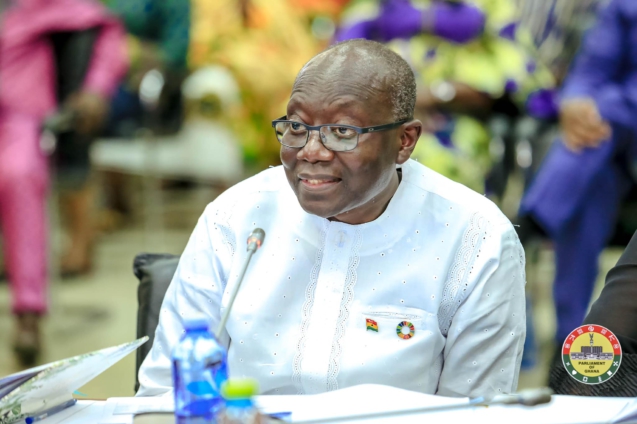The International Monetary Fund is pushing Ghana’s cash-strapped government to stop borrowing from its central bank, according to people familiar with the matter.
The IMF wants the two entities to sign a commitment to zero financing, said the people who asked not to be identified because they’re not authorized to speak publicly on the matter.
The accord is a condition Ghana is required to meet in order to secure final approval for a $3 billion IMF bailout, one of the people said.
An IMF spokesperson didn’t immediately respond to an email seeking comment. Spokespeople for the Ghanaian finance ministry and the central bank didn’t immediately respond to requests for comment.
The decision would bring a halt to central bank loans to the government that amount to about 40 billion cedis ($3.2 billion), according to one of the people.
Central-bank lending to Ghana’s government ballooned last year as investor concern about the state of the nation’s public finances depressed demand for its domestic bonds.
The central bank stepped in to provide funding for the budget and to roll over maturing loans.
An agreement would also bar state-owned enterprises such as the Ghana Cocoa Board, which owes about ¢7 billion, from using more central bank financing, according to the person.
The cocoa regulator — the sole buyer of cocoa from farmers in the world’s second-biggest producer of the chocolate ingredient — uses the funding to support growers.
Auction Undersubscribed
An auction of cocoa bills worth ¢940 million was “severely” undersubscribed last week, the central bank said after it declined to buy the instruments issued by the board.
The central bank used to step in when there were under-subscriptions, Steve Opata, who heads financial markets at the central bank, told Accra-based broadcaster Joy FM earlier this week.
“The bank decided to do things differently, so this shortfall was not financed by the central bank,” he said without giving further detail.
Ghana is overhauling an estimated 467 billion cedis of its loans. It’s been locked out of international capital markets since borrowing costs surged last year on investor concern about the state of Ghana’s public finances.
The country secured a staff-level agreement for a $3 billion IMF bailout last year, but final approval by the IMF board requires the fulfilment of so-called “prior actions,” which haven’t been made public.
It is also negotiating a restructuring plan for its local and external debt in a bid to show that it can make its loans more sustainable, another requirement to tap IMF funding.
Ghana is targeting a reduction in its debt to 55% of gross domestic product by 2028, compared with an IMF estimate of 105% in 2022.
Latest Stories
-
Fast-track structural transformation to address socio-economic challenges – AfDB
8 minutes -
CIZA’s ‘Isaka’ dominates digital charts
32 minutes -
TV host removed from NHIA board after outrage over questionable medical credentials
43 minutes -
Suspended CJ’s injunction application unanimously dismissed by Supreme Court
1 hour -
18% of Ghanaians paid bribes for public service in 2024 – GSS report
1 hour -
Ruling on Ofori-Atta’s motion against OSP’s ‘Wanted’ declaration adjourned to June 18
1 hour -
AfDB projects Ghana’s economy to slow to 4.5% in 2025
1 hour -
Prime suspect in UEW lecturer’s killing remanded
1 hour -
The Invasion Ghana 2025 – 5th Anniversary: A divine movement
1 hour -
Abdul Mumin nominated for La Liga Goal of the Season award
1 hour -
Star chefs Marvin and Clifford honored at school after stellar win in Indomie challenge
2 hours -
Mahama outlines bold initiatives, says 24-hour economy policy rolls out in July
2 hours -
Feyenoord, Strasbourg eyeing move for Ghana midfielder Lawrence Agyekum
2 hours -
Supreme Court unanimously strikes out suspended CJ’s supplementary affidavit
2 hours -
Ten artists receive honourary awards from Otumfuo
2 hours

